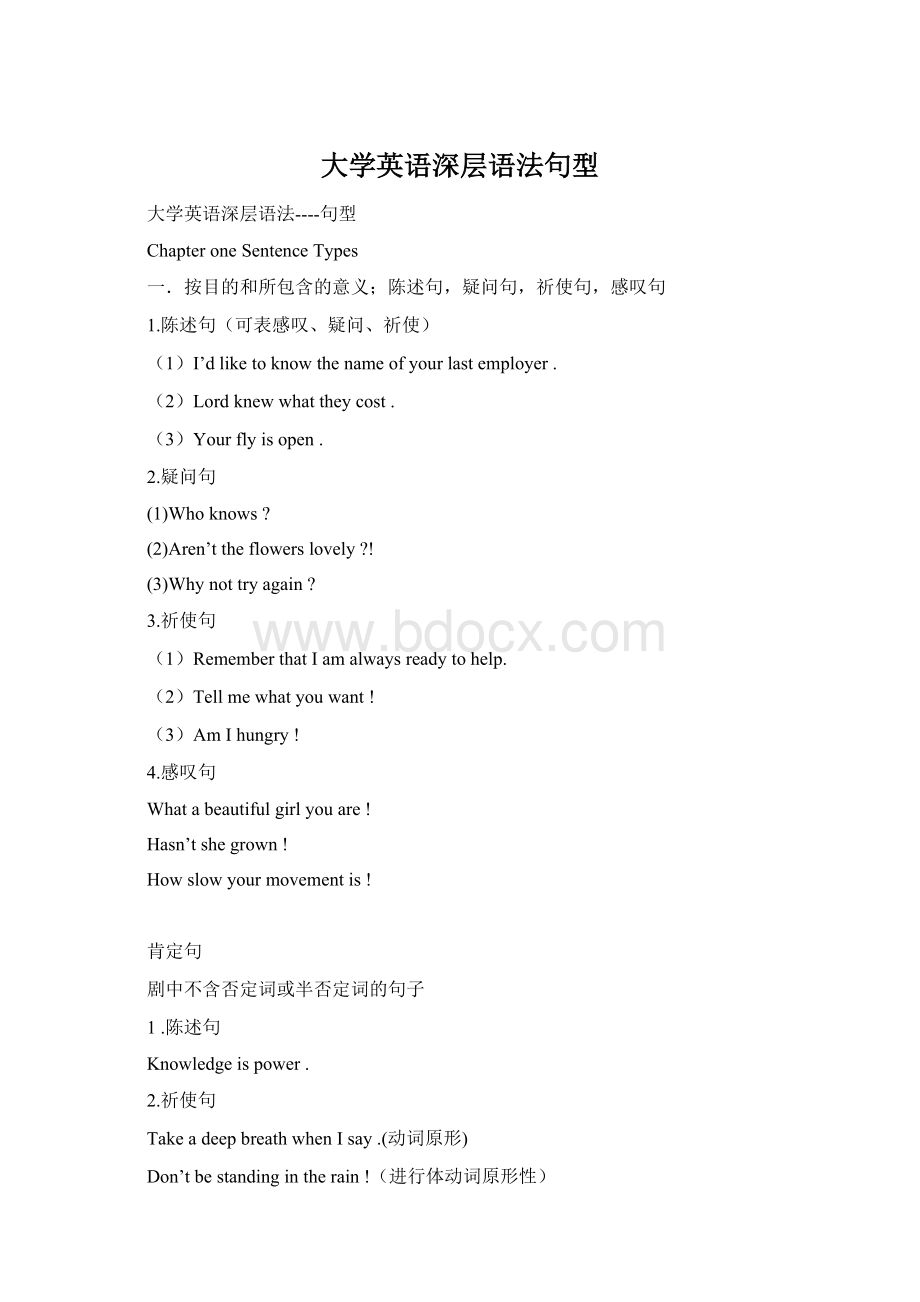大学英语深层语法句型.docx
《大学英语深层语法句型.docx》由会员分享,可在线阅读,更多相关《大学英语深层语法句型.docx(31页珍藏版)》请在冰豆网上搜索。

大学英语深层语法句型
大学英语深层语法----句型
ChapteroneSentenceTypes
一.按目的和所包含的意义;陈述句,疑问句,祈使句,感叹句
1.陈述句(可表感叹、疑问、祈使)
(1)I’dliketoknowthenameofyourlastemployer.
(2)Lordknewwhattheycost.
(3)Yourflyisopen.
2.疑问句
(1)Whoknows?
(2)Aren’ttheflowerslovely?
!
(3)Whynottryagain?
3.祈使句
(1)RememberthatIamalwaysreadytohelp.
(2)Tellmewhatyouwant!
(3)AmIhungry!
4.感叹句
Whatabeautifulgirlyouare!
Hasn’tshegrown!
Howslowyourmovementis!
肯定句
剧中不含否定词或半否定词的句子
1.陈述句
Knowledgeispower.
2.祈使句
TakeadeepbreathwhenIsay.(动词原形)
Don’tbestandingintherain!
(进行体动词原形性)
Goddamyou.(带呼语)
Let’snotwasteourtimearguingaboutit.(let引导)
Dowaitamoment!
(用DO强调)
Pleasesitdown!
(表命令、请求)
Sitdown,please.(表礼貌、客气)
Waithere,willyou?
(反义疑问句)
Getvaccinatedassoonasyoucan.(被动语态)
3.感叹句
表示惊叹、喜悦、气愤等
How+(被强调的形容词、副词、动词)+陈述语序
Howonderfulapictureitis!
What+被强调的名词、名词词组+陈述语序
Whatawonderfulpictureitis!
注:
how+形容词,只能用于单数可数名词,把a/an放在形容词后
Howbeautifulagirlsheis!
5.疑问句:
一般,特殊,混合,选择,附加
一般疑问句(多可用yes/no回答,用助动词、系动词、情态动词在句首)
Isheaworker?
Haveyouanystamps?
Canyoudriveacar?
DoesshespeakEnglish?
特殊疑问句
(疑问词+一般疑问句)
Whatdoyouwant?
WhatcanIdoforyou?
Whywassolittledone?
Howbrokenisthesystem?
Whoisyourbrother?
Whichisyours?
常见的几中特殊疑问句句型
Whatabout…..?
Howabout……?
(征求意见或建议,可互换)
=whatdouthinkabout……?
Whatabouthavingawalk?
HowaboutonSunday?
whynot+v(祈使句)
Whynottryagain?
(怎么会,怎么有可能)
Howcome+that分句
Howcomeyouaresolate?
(如果….该怎么办)
Whatif+分句
Whatifwemissthefirstbus?
让步条件的反义句
Whatthough+陈述句
=whatdoesitmatterif…..?
Whatthoughwearepoor?
Westillhaveeachother.
穷又有什么关系呢?
只要你还有我,我还有你。
句末放疑问词,叫追加疑问句
I’dliketoaskhimwhy?
特殊重叠疑问句
Whatiswhat?
Whichofwhom?
混合疑问句
(特殊+一般)
Whodouthinkisthemasterhere,Ioryou,Eh?
选择疑问句
用or连接的疑问句
Areugoingtothecinemaortothetheatre?
Howareugoing–byboatorbyplane?
Nowdoupeoplewanttoliveordouwanttodie?
附加疑问句
陈述句、祈使句、感叹句+附加疑问句
Sheisanurse,isn’tshe?
Thatclockisslow,isn’tit?
Thatclockisn’tslow,isit?
Openthedoor,won’tu?
Don’tforgettoposttheletter,willu?
Readthetext,willu?
Letusgo,willu?
Whatalovelychild,isn’tit?
Howthinsheis,isn’tshe?
附:
英语反义疑问句的主语和谓语用法
陈述句(肯)+反义疑问句(否)
Sheisanurse,isn’tshe?
陈述句(否)+反义疑问句(肯)
Heisn’tateacher,ishe?
Yes,heis.不,他是。
Icanalterthetermsofmywill,can’tI,wheneverIwish?
不论什么时候,只要我想改变我的遗嘱条款,我都可以改变,不是吗?
反义疑问句的主语
不定代词作陈主,反句主语它用they(英国英语)
Everybodyhasgotaticket,haven’tthey?
Nobodywaskilled,werethey?
不定代词物陈主,反句主语用it(everything,something,anything,nothing)
Everythinglooksfresh,doesn’tit?
Eachof….作陈主,反主人称2随变化
Eachofthepupilspassedtheexam,didn’tthey?
陈主为one,反主one(正式)oryou(非正式)
Onecan‘tbetoocareful,canone(you)?
陈主为such,反主单用it复用they
Suchishisnature,isn’tit?
Suchareyourexcuses,aren’tthey?
It’s(high/about)time+同位语从句,反主用it
It’stimewewenttobed,isn’tit?
陈主名词,反主用人称代词
Thisanswerisn’tcorrect,isit?
Yourfatherusedtobeamusician,didn’the?
不定式,动名词,词组,从句做陈主,反主用it
Liftingweightswillbuildarmmuscles,won’tit?
Thattheyarefriendsisnottrue,isit?
There引导的句子,反句仍用there
Therearefiveofthestudentsaltogether,aren’tthere?
That/this/these/those做陈主,反句人称用it或they
Thisisabook,isn’tit?
Thesearenotbooks,arethey?
主从复合使陈句,主主反主要一致
YouwereinthefactorywhenIlastsawyou,weren’tyou?
主从复合是陈句,主句主语第一人称,谓语为think/consider/guess/believe/expect/imagine/suppose,反句主语与从句主语保持一致
Idon’tthinkyou’reserious,areyou?
Idon’tsupposehecares,doeshe?
第一部分是第二人称祈使句,反义疑问句补上主语you
Don’ttakeawaymydictionary,willyou?
感叹句的反义疑问句:
反义疑问句谓语用be的一般现在是的否定式。
主语是人时用he/you等,物用it
Whatafunnyman,isn’tit?
Howhottheteais,isn’tit?
准反义疑问句不表示“是不是”,反义疑问句有自己的主语
Ifindthisfilmveryinteresting,don’tyou?
反义疑问句的谓语
否定词与反义疑问句
陈述句的主语有否定意义时,反义疑问句的谓语用肯定句。
Nobooksareperfect,arethey?
Thereisnorealdemocracyinthiscountry,isthere?
Nobodycandoit,canthey?
Noonecame,didthey?
陈述句的宾语有否定意义时,反义疑问句的谓语用肯定否定均可。
Hesaidnothingatthemeeting,did/didn’the?
陈述句中含有准否定词hardly/seldom/little/few/scarcely等词时,反义疑问句的谓语用肯定
Therewerefewpeoplethere,werethere?
Hehadlittleworkthatday,hadhe?
Sheishardlyabletoswim,isshe?
陈述句的谓语don’tthink之类有宾语从句是,这宾语从句的形式是肯定,意义是否定,反义疑问句的谓语用肯定句。
Idon’tthinkhewillcometomorrow,willhe?
陈述句是具有否定意义的谓语动词或带有否定意义的前缀或后缀,反义疑问句要用否定。
Heiscareless,isn’the?
Hefailedtocome,didn’the?
陈述句的主语是“noneof+名词”,反义疑问句的人称和数与主句中的名词保持一致。
NoneofthestudentsarefromJapan,arethey?
Noneofthenewssoundstrue陈述句部分有only,反义疑问句用肯定或否定均可。
Therewereonlytwopeoplepresent,weren’tthere?
/werethere?
情态动词与反义疑问句
陈述句谓语must”必须“,反义疑问句谓语mustn’t
Wemustgosoon,mustn’twe?
当must表“必要“时,反义疑问句谓语needn’t
Thenursemusttakegoodcareofthechildren,needn’tthey?
表mustn’t禁止时,用must
Umustn’tparkyourcarhere,mustu?
Mustbe表示“猜测,准时”时,反义疑问句谓语可视情况而定改为be/have/do等
Yourparentsmustbeinthekitchen,aren’tthey?
TommusthavebeentoBeijing,hasn’the?
如果陈述句中有过去的时间状语时,反义疑问句的谓语用过去式
Theymusthavegottherelastweek,didn’tthey?
陈述句有haveto时,反义疑问句的谓语用do的适当形式
Ajournalisthastobegoodatwriting,doesn’the?
陈述句中有实意动词need,反义疑问句用do
Ineedtobuyabook,don’tI?
用情态动词need时,反义疑问句用needn’t
Heneednotcomeatpresent,needhe?
有情态动词dare时,用daren’t;有实意动词dare时,用do是适当形式
Youdarenotwalkinthedarkness,dareyou?
Hedaredthedangeroflosinghisjob,didn’the?
用oughtto时,用ought(英国)或should(美国)
Ioughttocomplain,shouldn’tI?
/oughtn’tI?
有usedto时,用usedn’t/usen’t/didn’t
Youusedtosmokeapipe,usedn’tu?
有hadbetter时,用hadn’t
Wehadbettertakeoffourshoes,hadn’twe?
Uhadbetternotwakemeupwhenucomeback,hadu?
有wouldrather时,用wouldn’t
You’dratherstayinbedthangetuptoeat,wouldn’tu?
当是wish时,用may,两部分都用肯定句
Iwishtostayalittlelonger,mayI?
当有使役动词have构成hadsomethingdone时,用did
Shehadherhaircut,didn’tshe?
当have为“有”时,用have,美国英语可用do;当“吃、经历、得到、遭遇”时,有do
Hehadahousehere,didn’tshe?
Hehasbreadandmilkforbreakfast,doesn’the?
当有am时,用aren’tI/amInot?
Iambeautiful,aren’tI/amInot?
当陈述部分是肯定祈使句时,用willyou或won’tu:
若为否定,反义疑问部分用willu/canu?
:
let’s开头时用shallwe或okay
Let’sgo,shallwe?
Letusgo,willu?
陈述部分是并列句时,反义疑问句的谓语与邻近的分句的谓语保持一致
Shewastoldagainandagain,butshestillcouldn’trememberit,couldshe?
当陈述部分句子过长时,可将反义疑问句置于作用词后(系动词,助动词,情态动词),镶嵌在句子之间,前后用逗号隔开,句末用问号
Shehadn’tatthattime,hadshe,beenfullyrecognizedasaseriouswriter?
否定句
含有否定词或半否定词的句子
常用的否定词有not/no/never/noone/nothing/none/nowhere/neither/nor等
常用的班否定词有hardly/barely/rarely/scarcely/seldom/few/little等
否定陈述句
Uarenotastudent,你不是学生。
Uarenostudent.你不配当学生。
Shehasn’tpaidthemoneyyet.
Ican’tseethescreen.
句中无作用词时,否定句要加do的相应形式
Idon’tdaretoasku,myyounglady,howolduare>
Ithinkuarenotright。
否定疑问句
否定的一般疑问句,译成“难道,莫非”,提问者带有倾向性。
用no回答译成“是的,对”,用YES回答译成“不,不是,不对”
Aren’tutired?
难道你不累吗?
Yes,Iam.不,我累了。
Didn’tuhearthebell?
莫非你没听见铃声吗?
Yes,Idid.不,我听见了。
否定的特殊疑问句
Whydon’twesingittogether?
Whodoesn’tknow?
否定的选择疑问句
Wasn’theelectedpresidentorvice-president?
否定反义疑问句
Youwon’tgototheworkshop,willu?
Don’tforgettoposttheletter,willu?
否定祈使句
在动词原形前加上Don’t,never等
Don’tbotheraboutgenius.Don’tworryaboutbeingclever.
Trusthardwork,perseveranceanddetermination,
不要为自己是否有天分而烦恼,不要为自己是否聪明而忧心,要相信勤奋、毅力和决心。
Don’tlistentotheirwords,fixyourattentionontheirdeeds.
不要听他们说什么,要看他们做什么。
Neverdothingsbyhalves.
凡做事不要半途而费。
Let’s的否定形式有三种
正式用法
Let’snotgotodancetonight.
Let’snotbegreedy.
英国的非正式用法
Don’tlet’sgotodancetonight.
Don’tlet’sbegreedy.
美国非正式用法
Let’sdon’tgotodancetonight.
Let’sdon’tbegreedy.
否定感叹句
Wasn’titamarvelousconcert!
英语的否定句专题
部分否定和全部否定
否定的范围有四种
全部否定:
代名词(all,both,everybody,everything)代副词(everywhere,always,altogether)
部分被否定:
(some,oneorother,somebody,something)(somewhere,sometimes,somewhat)
全部否定:
(none,neither,nobody,nothing)(nowhere,never,noway)
非肯定词:
(any,either,anybody,anything)(anywhere,ever,anyway)
部分否定的否定是部分否定
Someofthesebooksarenotusefultome.
全部否定的否定式是全部肯定
Hewasneverdissatisfiedwithmywork.
全部肯定的否定是部分否定
Greatmenarenotalwayswise.
非肯定次的否定是全部否定
Notany=no
Noteither=neither
Notanybody=nowhere
Notanything=nothing
Notever=never
Notanywhere=nowhere
部分否定的否定词两种位置及用法
否定词位于作主语的全部肯定词之前
Notalltheanswersareright.
肯定译法:
所有的答案不都是正确的。
否定译法:
这些答案中有些是正确的。
Notbothofthemaremybrothers.
否定译法;他俩并不都是我的兄弟.
肯定译法:
他两当中有一个是我的兄弟。
否定词位于动词之后,剧中有全部肯定次仍是部分否定。
Allmenarenotgood.
否定译法;不是所有的人都是好人。
肯定译法;有些人是好人。
Bothchildrenarenotclever.
Everymancannotbeapoet.
全部否定;”全部否定词+肯定句谓语”
Nomanisrichenoughtobuybackhispast.
不论多么富有,世界上没有任何人能买回他过去的光阴。
Nosweetofflowersleadstoglory.
没有任何一条通向光荣之路是铺满鲜花的。
Nothingisimpossibletoawillingheart.
对于一个意志坚定的人来说没有办不到的事。
Neitherofthemcanswim.
他两都不会游泳。
准否定
带有准否定词的句子也是否定句,他除了有否定意义外,还有一丝保留,没有把话说绝。
Hardly/scarcely=almostno/not
Little=notmuch
Seldom/rarely=notoften
Few=notmany
Barely=onlyjust
Hehadhardlyanyschooling.
他几乎等于没上过正规学校。
Hecouldbarelykeepbodyandsoultogether.
他只能勉强维持生活。
准否定词词组也等于频率副词加全词否定
Hardlypossible=almostimpossible=hardlyany=almostno(几乎没有)
Scarcelyever=almostnever=scarcelyanything=almostnothing(几乎没有东西)
Itishardlypossible.
这几乎是不可能的。
Hescarcely